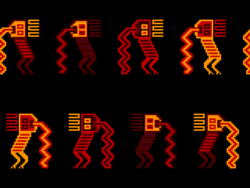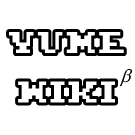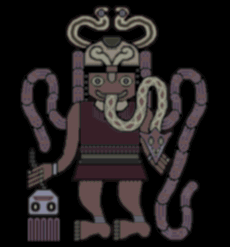The Style Guide has recently been rewritten. Please take a moment to review the new guidelines.
m (i think the event itself is important enough to not be at the end. i kept the added info from last edit of course) |
m (use audio template) |
||
| Line 16: | Line 16: | ||
Their name comes from their picture file and soundtrack, both of which are simply titled "KALIMBA", seemingly named after the instrument used in the song. | Their name comes from their picture file and soundtrack, both of which are simply titled "KALIMBA", seemingly named after the instrument used in the song. | ||
{{audio|title=KALIMBA in-game|filename=KALIMBA.ogg|align=center}} | |||
In ''[[Yume Nikki:YUMENIKKI –DREAM DIARY–|YUMENIKKI –DREAM DIARY–]]'', they appear as a tapestry in Madotsuki's dream room, replacing a tapestry which normally depicts the [[Yume Nikki:Nexus|Nexus]] background. | In ''[[Yume Nikki:YUMENIKKI –DREAM DIARY–|YUMENIKKI –DREAM DIARY–]]'', they appear as a tapestry in Madotsuki's dream room, replacing a tapestry which normally depicts the [[Yume Nikki:Nexus|Nexus]] background. | ||
| Line 22: | Line 22: | ||
==Trivia== | ==Trivia== | ||
*[[Yume Nikki:KIKIYAMA|KIKIYAMA]], the creator of ''Yume Nikki'', also made a full-length version of the song before they started working on the game, being the only one other than the [[Yume Nikki:FC House|FC House]] theme to be a complete song, although this one isn't heard in-game. | *[[Yume Nikki:KIKIYAMA|KIKIYAMA]], the creator of ''Yume Nikki'', also made a full-length version of the song before they started working on the game, being the only one other than the [[Yume Nikki:FC House|FC House]] theme to be a complete song, although this one isn't heard in-game. | ||
{{audio|title=KALIMBA by KIKIYAMA (full track)|filename=KALIMBA by KIKIYAMA.ogg|align=center}} | |||
==[[Yume Nikki:Theories|Theories]]== | ==[[Yume Nikki:Theories|Theories]]== | ||
Revision as of 22:30, 29 April 2024
| KALIMBA | |
|---|---|

| |
| Basic Info | |
| Role | Displays a full-screen event |
| Collectibles | None |
| Events | None |
| Location | |
| Other | |
| Size | Standard |
| Killable? | No |
The KALIMBA (カリンバ) are a group of Paracas-like characters that appear during the KALIMBA TV Channel event.
Overview
The KALIMBA resemble armless humanoid entities, each having a color scheme composed of orange, red, and maroon. They have a slightly hunched position and appear to be vomiting with tilted heads as they dance together in a straight line. They appear to be one of the many instances of indigenous inspired artwork found throughout the game. When the television in Madotsuki's Dream Room is turned on, there is a 1/8 chance that a KALIMBA face will appear on the television instead of an eye, and the screen will fade to black before showing the two rows of KALIMBA dancing together to a tribal beat.
Their name comes from their picture file and soundtrack, both of which are simply titled "KALIMBA", seemingly named after the instrument used in the song.
In YUMENIKKI –DREAM DIARY–, they appear as a tapestry in Madotsuki's dream room, replacing a tapestry which normally depicts the Nexus background.
Trivia
- KIKIYAMA, the creator of Yume Nikki, also made a full-length version of the song before they started working on the game, being the only one other than the FC House theme to be a complete song, although this one isn't heard in-game.
Theories
One of the most apparent visual themes in Yume Nikki is pre-Columbian indigenous-style art, more specifically, creatures that resemble those of the ancient Paracas culture that lived more than 2,000 years ago. In this ancient Peruvian culture, "ritual vomiting" was a practice where a person vomiting could be seen as them releasing toxins out of their system, both physically and spiritually. In Paracas art, this is depicted as the manifestation of a snake to symbolize this leaving the body, which can be seen with the KALIMBA. It's possible that Madotsuki feels very connected with their culture, as she even has a rug with an ancient pattern in the real world. The Bloody Touching Monster and the parallax background in Eyeball World are other examples of vomiting in the game.


